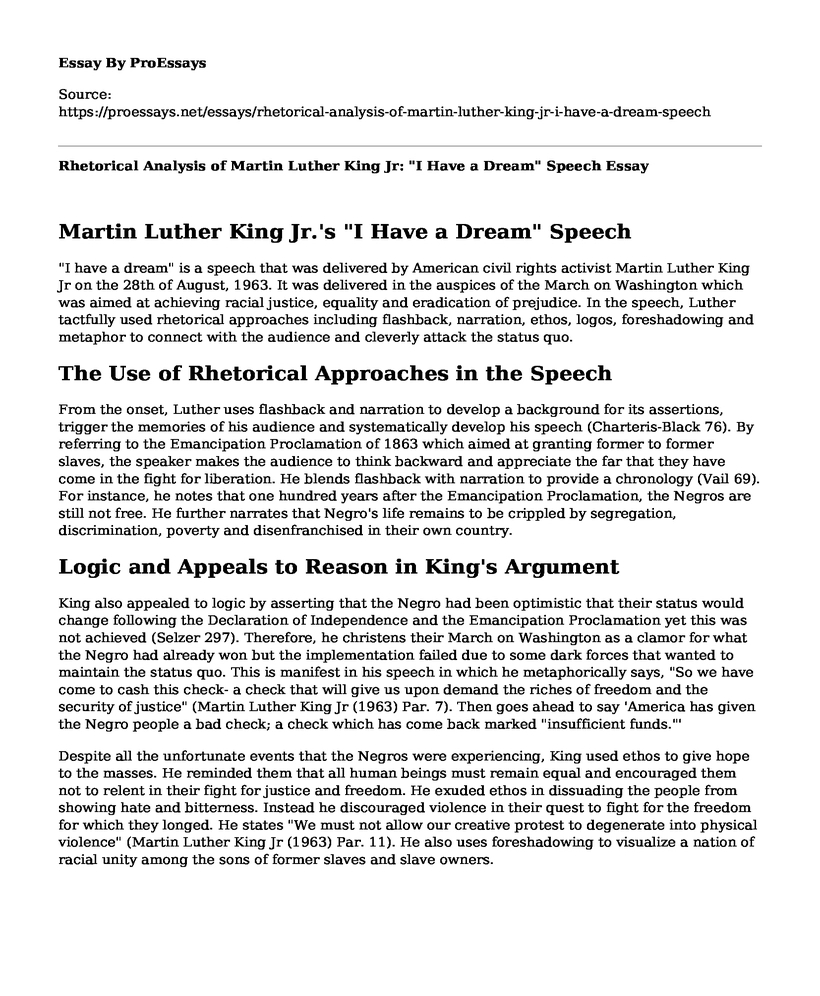Martin Luther King Jr.'s "I Have a Dream" Speech
"I have a dream" is a speech that was delivered by American civil rights activist Martin Luther King Jr on the 28th of August, 1963. It was delivered in the auspices of the March on Washington which was aimed at achieving racial justice, equality and eradication of prejudice. In the speech, Luther tactfully used rhetorical approaches including flashback, narration, ethos, logos, foreshadowing and metaphor to connect with the audience and cleverly attack the status quo.
The Use of Rhetorical Approaches in the Speech
From the onset, Luther uses flashback and narration to develop a background for its assertions, trigger the memories of his audience and systematically develop his speech (Charteris-Black 76). By referring to the Emancipation Proclamation of 1863 which aimed at granting former to former slaves, the speaker makes the audience to think backward and appreciate the far that they have come in the fight for liberation. He blends flashback with narration to provide a chronology (Vail 69). For instance, he notes that one hundred years after the Emancipation Proclamation, the Negros are still not free. He further narrates that Negro's life remains to be crippled by segregation, discrimination, poverty and disenfranchised in their own country.
Logic and Appeals to Reason in King's Argument
King also appealed to logic by asserting that the Negro had been optimistic that their status would change following the Declaration of Independence and the Emancipation Proclamation yet this was not achieved (Selzer 297). Therefore, he christens their March on Washington as a clamor for what the Negro had already won but the implementation failed due to some dark forces that wanted to maintain the status quo. This is manifest in his speech in which he metaphorically says, "So we have come to cash this check- a check that will give us upon demand the riches of freedom and the security of justice" (Martin Luther King Jr (1963) Par. 7). Then goes ahead to say 'America has given the Negro people a bad check; a check which has come back marked "insufficient funds."'
Despite all the unfortunate events that the Negros were experiencing, King used ethos to give hope to the masses. He reminded them that all human beings must remain equal and encouraged them not to relent in their fight for justice and freedom. He exuded ethos in dissuading the people from showing hate and bitterness. Instead he discouraged violence in their quest to fight for the freedom for which they longed. He states "We must not allow our creative protest to degenerate into physical violence" (Martin Luther King Jr (1963) Par. 11). He also uses foreshadowing to visualize a nation of racial unity among the sons of former slaves and slave owners.
Works Cited
Martin Luther King Jr (1963) "I Have a Dream" Charteris-Black, Jonathan. Analyzing political speeches: Rhetoric, discourse, and metaphor. Macmillan International Higher Education, 2013.
Selzer, Jack. "Rhetorical analysis: Understanding how texts persuade readers." What writing does and how it does it. Routledge, 2003. 285-314.
Vail, Mark. "The" Integrative" Rhetoric of Martin Luther King Jr.'s" I Have a Dream" Speech." Rhetoric & Public Affairs 9.1 (2006): 51-78.
Cite this page
Rhetorical Analysis of Martin Luther King Jr: "I Have a Dream" Speech. (2022, Oct 03). Retrieved from https://proessays.net/essays/rhetorical-analysis-of-martin-luther-king-jr-i-have-a-dream-speech
If you are the original author of this essay and no longer wish to have it published on the ProEssays website, please click below to request its removal:
- Biography of Isaac Newton
- Horror Films Festivals
- "A Worn Path" Analysis Essay
- Gang Phenomenon in U.S. Prisons: A Rapid Spread Across America - Research Paper
- Movie Analysis Essay on The Yellow Earth, Timbuktu and The Red Sorghum
- The Varied Mythology of Ancient Egypt: 4000 BCE - Essay Sample
- Paper Sample on White Superiority Over Black: 12 Years a Slave Showcases Brutal History







